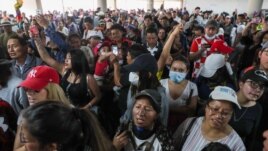15 October, 2019
Ecuadorean President Lenín Moreno has officially canceled his own law to cut government subsidies on fuel prices.
Moreno signed a declaration overturning the law on Monday. The move came after days of protests against the measure. The cancellation returned fuel prices to their former levels.
The Associated Press described the signing as a blow to Moreno's presidency, and said it leaves big questions about the finances of the oil-producing nation. But the move represents a win for Ecuador's indigenous communities, who led the protests.

People gather in the aftermath of the last days' protests, after the government of Ecuadorian President Lenin Moreno agreed to repeal a decree that ended fuel subsidies, in Quito, Ecuador October 14, 2019. REUTERS/Ivan Alvarado
The clashes marked the latest in a series of political protests resulting from reform plans supported by the International Monetary Fund (IMF). Across Central and South America, political divisions have caused unrest as governments seek to fix underlying economic problems.
Moreno's law ended 40 years of government support for low oil prices. The measure was estimated to have freed up nearly $1.5 billion per year in the government's budget. That money would have helped shrink Ecuador's financial deficit as required under a deal Moreno signed with IMF officials.
However, the measure was widely unpopular and incited days of protests. The government ordered the military to enforce a curfew around major public offices, airports and oil production centers. Yet the unrest turned increasingly violent.
Moreno gave in to the chief demand of the demonstrators late on Sunday. A few hours later, he published a message on social media. "We have opted for peace," it read.
Later on Monday, he signed the document officially overturning the law. He said that the government would seek to define a new plan for the fuel subsidies that does not help the wealthy or smugglers.
For now, Moreno's actions brought much-needed calm to Quito, Ecuador's capital. People there began to establish order and clear away the barriers that had appeared in recent days.
Indigenous leader Jaime Vargas told reporters, "We have freed the country."
The protests had grown increasingly chaotic after the government launched operations against what it called extremists who had joined the protesters.
Officials reported that some military vehicles, a local television station and a government office were set on fire.
One of the government's first concerns will be to restart oil production. Production stopped in some areas after protesters broke into processing centers.
"We need to re-establish oil production," said Energy Minister Carlos Perez. He added that Ecuador stopped producing about 2 million barrels of oil during the protests. Perez added, "I expect things to be back to normal in about 15 days."
I'm Jonathan Evans.
Alexandra Valencia reported this story for the Reuters news service. Jonathan Evans adapted the report for VOA Learning English. George Grow was the editor.
________________________________________________________________
Words in This Story
chaotic – adj. in a state of complete confusion or disorder
indigenous – adj. produced, living, or existing naturally in a particular region or environment
opt(ed) – v. to make a choice
smugglers – n. people who move someone or something from one country into another illegally and secretly
subsidies – n. money that is paid usually by a government to keep the price of a product or service low or to help a business or organization to continue to function